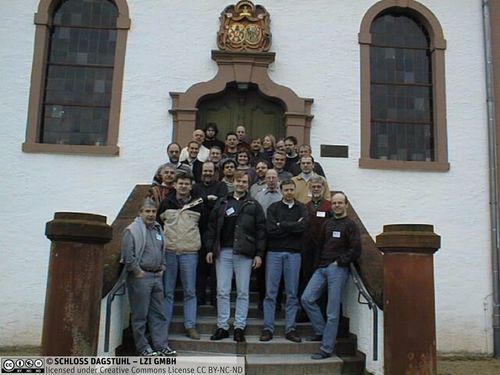Dagstuhl Seminar 00051
Digital Media in Computer Science Teaching at University Level
( Jan 30 – Feb 04, 2000 )
Permalink
Organizers
- O. Foelsche (Darthmouth Coll, Hanover)
- T. Ottmann (Freiburg)
- W. Coy (HU Berlin)
Contact
The seminar will continue inquiries that led to Dagstuhl Seminar 98051 New Media in Computer-Science Teaching at the University Levelb (1.-6. February 1998). The actual interest in the use of digital media in university teaching has started a new discussion on technology as well as on didactics, and, more importantly, on means and objectives of university curricula.
Several lines of development in media teaching technology were identified in the closing section of the last conference.
HiTech vs. LoTech approaches
Different technologies may be used for media-enhanced teaching. While rapid advances in technology seem to dictate the use of very advanced but sometimes very expensive, often experimental and unstable hardware and software, suitably adapted "off-the-shelf" equipment has also led to interesting and often successful experiments. Both approaches should be discussed and evaluated in regard to their relative merits and disadvantages.
System and Storage Technologies
Multimedia repositories are the natural extension of successful teaching experiments. What technology is suitable for the construction of such repositories? What technology is most suitable for indexing, access, and presentation? Who should be the guardian of digital media archives? What distribution channels at what cost can satisfy the needs? How can traditional libraries or publishing house be involved? What cross-disciplinary implications need to be dealt with?
The Role of Teachers
Teaching style may become strongly influenced by the use of digital media technology. Its influence on didactics and curricula shall be discussed. A focus will be on computer science education, but related studies should be included.
Differences between Science Education and Humanities Education
Computer Science education has developed a specific style of teaching and an approach to its classroom. This is different from other areas like the humanities, language instruction, social sciences, or even science and mathematics teaching. Will media/technology enhanced teaching dictate common approaches or will discipline-specific approaches evolve? What are the mechanisms of integration of technology in the various disciplines?
Political Issues
On-line publications, free access to teaching materials on the web, free access to complete credit granting courses on the web, and even open university structures with access to university degrees by internet do more than challenge traditional styles of teaching and research. How deep does this challenge reach, and to what extent must universities be ready to respond or change. Are present structures capable of dealing with the issues of governance?
The 1998 conference has provided a much clearer focus for the participants. The year 2000 conference will enable participants to familiarize themselves with the impact of major technological changes in the use of enhanced audio-video-technology, gigabit lines, xDSL-, wireless technologies, narrow and broadband streaming technologies introduced by telecoms worldwide. Teaching and learning will become the prime focus of the participants since the capabilities of the technology will probably have stabilized somewhat to permit proper evaluation of costs as well as pedagogical efficiency.
The invited participants come mainly from computer science departments, but we want to include some colleagues from teaching sciences, language and philosophy departments that are experimenting with modern media technology in teaching. Participants are invited from Austria, France, Germany, Hungary, UK and USA.
The organizers of this workshop are convinced that the active participation will lead to new contacts and joint projects in the future and to a realistic assessment of the field by a competent group of experts. It would be a great pleasure and honor to us if you could participate in this seminary.
- O. Foelsche (Darthmouth Coll, Hanover)
- T. Ottmann (Freiburg)
- W. Coy (HU Berlin)


